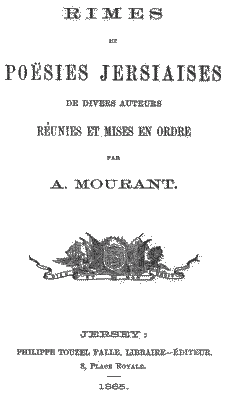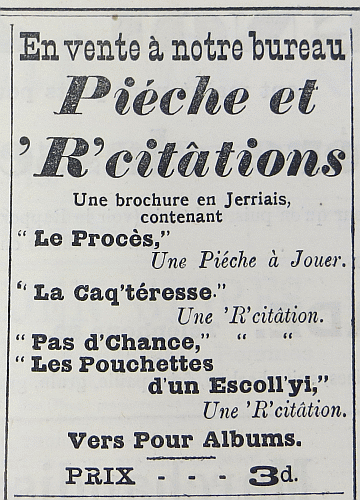 There has been, lately, a revival of interest in the Jersey patois. During the last century, such eminent men as the late Bailiff Marett, Jurat A.A. Le Gros, one of Jersey's most erudite archaeologists, and Jurat Langlois, to say nothing of versatile Philippe Asplet and the elegiac-loving Hy. Luce-Manuel, proved themselves to be staunch supporters and gifted exponents of the local vernacular, the use of which was then more general than it may now claim to be, especially regarding its employment as the common means of expression among the younger generation.
There has been, lately, a revival of interest in the Jersey patois. During the last century, such eminent men as the late Bailiff Marett, Jurat A.A. Le Gros, one of Jersey's most erudite archaeologists, and Jurat Langlois, to say nothing of versatile Philippe Asplet and the elegiac-loving Hy. Luce-Manuel, proved themselves to be staunch supporters and gifted exponents of the local vernacular, the use of which was then more general than it may now claim to be, especially regarding its employment as the common means of expression among the younger generation.For those whose ear has long been acquainted with Jersey-French and to whom its peculiar intonations are familiar either from the cradle or from long residence in the island, much interest is to be derived from a rarely-opened volume to be found in the Public Library, entitled “Poésies Jersiaises” and published, about fifty years ago, by Abraham Mourant. It contains a great many different pieces by different writers, some of no little literary value, as was well pointed out by François-Victor Hugo, in reproducing a portion of Marett's “Fille Malade” in his beautiful work “La Normandie Inconnue.” Others, merely of a transient character, deal with local political happenings and are replete with allusions of a personal nature, such as the Jerseyman has ever been fond of leveling at his adversary, - although very rarely ready himself to take any such lying down! These latter, naturally, now lose whatever particular interest the originally possessed, as the unsympathetic hand of time has long ago obliterated all those human connecting links which would give them a living interest.
But others remain, which will well repay perusal, examples of the remarkable hardihood and persistency of a language which, throughout the centuries, has retained its archaic characteristics, typical of the race whose channel of thought it remained in spite of ever-growing political and commercial intercourse with England (it surely would be a misnomer to call this the Mother Country of Jersey, Guernsey, or Sark) and notwithstanding the unceasing advance of the allied language on the French mainland towards literary progress and perfection. With the disappearance of the Jerseyman of the old school, however, the examples of the written patois became rarer and its publication was for a long time limited to irregular and more or less infrequent contributions to the local French newspapers (some of these however such as “Bram Bilo's” famous trip to the great Paris exhibition, proving so popular as to ensure profitable reproduction in book form) and to the prose and verse selections published annually in the Almanacks of the “Old” and the “Nouvelle” Chroniques, and for which the same writers have been responsible during many years.
 The 1912 Eisteddfod happily varied its former programmes by the tentative and most successful inclusion of Jersey-French: under the quite mistaken title of “Norman French”! for there is a marked difference between the patois of the peasant of Normandy, and that of the Channel Islanders, in spite of their common origin and present similarities. This gave to the “vier jerriais” a remarkable fillip, it being a sort of official recognition of the persistent efforts made by its several exponents to keep its written and spoken manifestations before the public. In spite of the seemingly ineffectual preaching in the desert, this was now shown to be bearing fruit and the popularity of patois recitations has been in evidence right through the winter and does not seem likely to decline for a long time yet. Among the few writers of Jersey-French at the present day the “Morning News” may be allowed to quote its witty regular contributor PETER PAIN, who has now become an intimate acquaintance of a great many readers, as also have Laizé and Lonore, his straightlaced wife and most marriageable daughter.
The 1912 Eisteddfod happily varied its former programmes by the tentative and most successful inclusion of Jersey-French: under the quite mistaken title of “Norman French”! for there is a marked difference between the patois of the peasant of Normandy, and that of the Channel Islanders, in spite of their common origin and present similarities. This gave to the “vier jerriais” a remarkable fillip, it being a sort of official recognition of the persistent efforts made by its several exponents to keep its written and spoken manifestations before the public. In spite of the seemingly ineffectual preaching in the desert, this was now shown to be bearing fruit and the popularity of patois recitations has been in evidence right through the winter and does not seem likely to decline for a long time yet. Among the few writers of Jersey-French at the present day the “Morning News” may be allowed to quote its witty regular contributor PETER PAIN, who has now become an intimate acquaintance of a great many readers, as also have Laizé and Lonore, his straightlaced wife and most marriageable daughter.Another, is Mr. E. J. Luce, of the “Nouvelle Chronique,” whose writings have been many and varied, during the last decade. His latest effort is to be found in a small thirty-two page booklet entitled “Pieches et R'citations,” which has just been published from the office of the paper with which he is connected.
The contents of this venture include a humorous comedietta in verse, arranged for the stage, a few recitations, and a series of quotations intended for autograph albums. All these are in verse and the comedietta especially will be found to have required a great deal of care in its preparation, before the full story which it relates was rhymed from start to finish. As is explained in the preface, where Jersey-French is also exclusively used, two of the recitations are by Mr. J. Picot, of Midland, Trinity, and one of these is a translation of Robert Service's “Hard-Luck Henry,” an entertaining anecdote of life in the Far North. Not the least amusing portion of the booklet, perhaps, will be found in the advertisements, where novelty is the predominant note. Like the rest of the printed matter, they are entirely in Jersey-French and this, together with their original composition, makes them appreciably different from the usual stereotyped mode of advertising.
The price of the publication is threepence and it is sure to have a ready sale amongst lovers of the patois, and will be especially acceptable to Jerseymen beyond the seas. As a matter of fact one of the first copies sold is now, we are informed, on its way to Khartoum. The booklet is now on sale at the “Nouvelle Chronique” offices.
